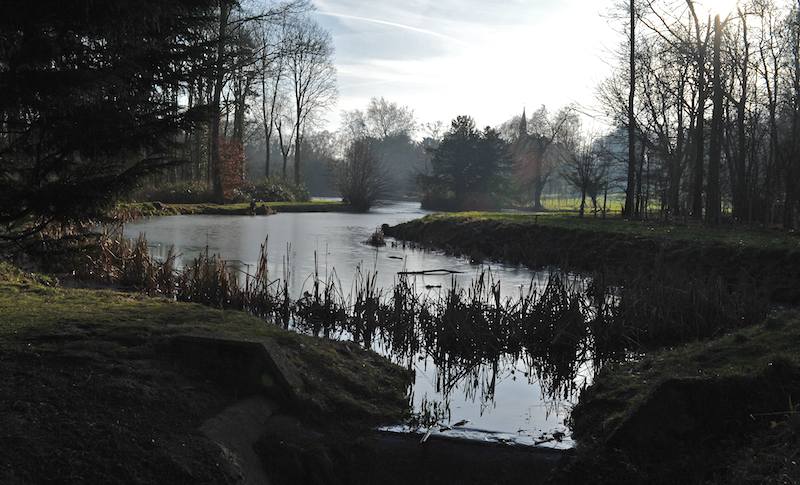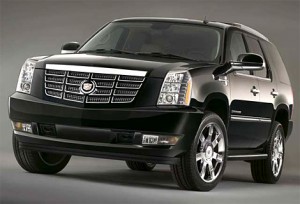Trompe l’oeil (or Beware of the Cat)
Well, it’s one way to keep the buggers out
The lake in winter
Snapped on our walk this afternoon near where we live. The lake was laid out by Capability Brown and a few years ago was restored to its original shape.
Flickr version here.
Many happy returns of the kernel
Today is Linus Torvalds’s birthday. In celebration, Glyn Moody has a lovely account of the first stirrings of Linux.
Nipples, lies and digital images
There’s a wonderful analysis by Secure Computing of the way an image in the Victoria’s Secret catalogue was tastefully PhotoShopped, probably by a graphic artist as a routine job. There’s nothing really sinister in the story (a missing handbag, eyes and teeth enhanced, a nipple removed). It’s really just a fascinating forensic analysis of how you can detect PhotoShopped alterations if you know how.
There’s good news and bad news here. On the one hand, the case study provides a cautionary tale about how untrustworthy digital images have become; on the other, it shows how someone with the right tools and forensic skills can detect alterations.
Update: To be fair to Victoria’s Secret, they responded well to the critique (unlike Ralph Lauren, which in a similar case resorted to the DMCA takedown tactic).
The Noughties
Conclusion of this morning’s Observer column.
What all this suggests is that the noughties were the years when the internet went from being exotic to mainstream – indeed, to being a utility. No child under the age of 11 knows there was once a world without Google. Most teenagers cannot imagine a world without Facebook or YouTube. And even the proportion of adults who can remember travel agents is declining fast. Almost without noticing, we have become dependent on the network. Our task in the next decade will be to make sure it remains free and open, rather than the captive of the corporations and governments who would love to control it. Happy New Year!
The coming Chinese century
There’s an astonishing piece by Mark ‘Six Degrees’ Lynas in the Guardian.
The truth is this: China wrecked the talks, intentionally humiliated Barack Obama, and insisted on an awful “deal” so western leaders would walk away carrying the blame. How do I know this? Because I was in the room and saw it happen.
China’s strategy was simple: block the open negotiations for two weeks, and then ensure that the closed-door deal made it look as if the west had failed the world’s poor once again. And sure enough, the aid agencies, civil society movements and environmental groups all took the bait. The failure was “the inevitable result of rich countries refusing adequately and fairly to shoulder their overwhelming responsibility”, said Christian Aid. “Rich countries have bullied developing nations,” fumed Friends of the Earth International.
All very predictable, but the complete opposite of the truth.
Astonishing, if true. So what’s China’s game?
Why did China, in the words of a UK-based analyst who also spent hours in heads of state meetings, “not only reject targets for itself, but also refuse to allow any other country to take on binding targets?” The analyst, who has attended climate conferences for more than 15 years, concludes that China wants to weaken the climate regulation regime now “in order to avoid the risk that it might be called on to be more ambitious in a few years’ time”.
This does not mean China is not serious about global warming. It is strong in both the wind and solar industries. But China’s growth, and growing global political and economic dominance, is based largely on cheap coal. China knows it is becoming an uncontested superpower; indeed its newfound muscular confidence was on striking display in Copenhagen. Its coal-based economy doubles every decade, and its power increases commensurately. Its leadership will not alter this magic formula unless they absolutely have to.
What’s funny about this is that China is beginning to throw its weight about in a thoroughly American fashion. Looks like we all have some adjusting to do.
Surreal estate
Tiger Woods’s unbelievably naff other place in Florida. Described by one observer as “a cross between a discount motel and a beachside nursing home”.
Tiger’s crash: the Top Gear angle
Phil Greenspun has decided not to order the Cadillac Escalade after all.
Imagine a group of engineers so gifted that U.S. taxpayers were willing to spend more than $50 billion to keep them together. These folks designed a vehicle that weighs 6000 lbs. empty and is advertised as having safety advantages over cars designed by companies that operate without continuous government assistance. Tiger Woods, a man whose physique is presumably far more durable than average, drives this vehicle across a lawn and into a tree at a pretty low speed. Did he bound out of his Cadillac Escalade without a scratch? According to the New York Times, “Woods was slipping in and out of consciousness. [the police] said Woods suffered lacerations to his upper and lower lips and blood in his mouth, and that he was treated on scene for 10 minutes before being transported to a nearby hospital.”
Yep. I’ve cancelled my order too.






